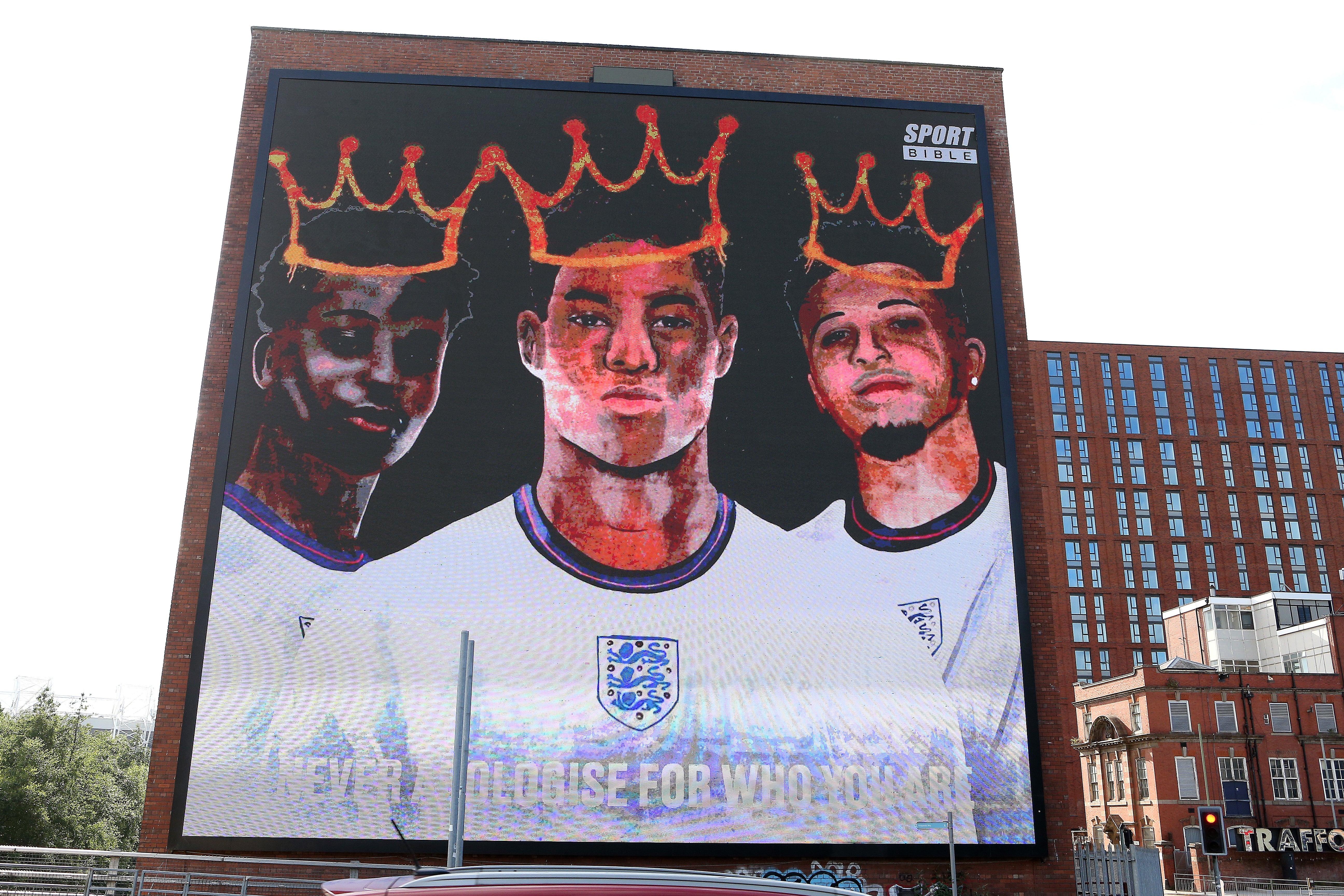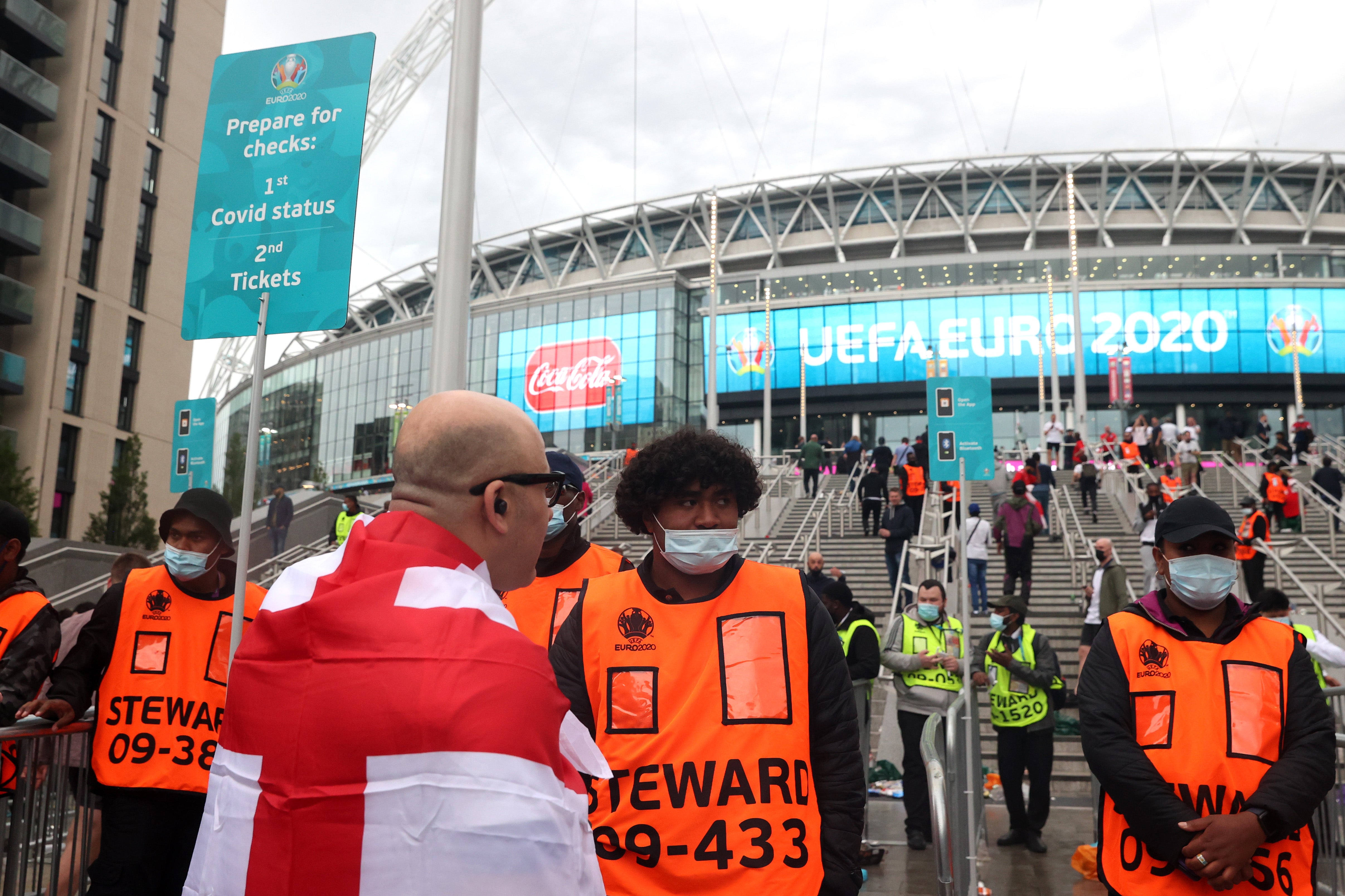In this benighted nation, footballers are beacons of hope
Keep politics out of sport? Those who trot out that inane mantra have ensured that the game will only become more political, writes Tony Evans


Your support helps us to tell the story
From reproductive rights to climate change to Big Tech, The Independent is on the ground when the story is developing. Whether it's investigating the financials of Elon Musk's pro-Trump PAC or producing our latest documentary, 'The A Word', which shines a light on the American women fighting for reproductive rights, we know how important it is to parse out the facts from the messaging.
At such a critical moment in US history, we need reporters on the ground. Your donation allows us to keep sending journalists to speak to both sides of the story.
The Independent is trusted by Americans across the entire political spectrum. And unlike many other quality news outlets, we choose not to lock Americans out of our reporting and analysis with paywalls. We believe quality journalism should be available to everyone, paid for by those who can afford it.
Your support makes all the difference.Even after its worst moments, English football has shown a remarkable ability to renew itself. To rebound and thrive. Although perhaps not in a manner that was expected or desired.
The past few days have been a pretty bleak time for the sport. Events at Wembley were predictably depressing on and off the pitch. The weeks before the Euro 2020 final put the game on the front line of the culture wars again, this time over the England team taking the knee to express their opposition to discrimination and racism. The backlash after the defeat on penalties by Italy justified the squad’s stance. The reaction to three black players missing their spot-kicks was like a stone on society being upturned. All the ugliness of an institutionally racist country was on display. And the bigotry is state sponsored.
When the prime minister and home secretary refused to condemn those who booed a straightforward, anti-racist stance it became clear whose side the government was on. Forget the foolishness about “gesture politics.” This went beyond dog whistles from Boris Johnson and Priti Patel. The writing was on the Marcus Rashford mural long before Sunday night.
The players are the salvation of the English game. Tyrone Mings exposed the vacuousness of Patel’s lamentable response to the racist abuse. Rashford and Jadon Sancho eloquently articulated the hurt they have suffered and refused to be cowed by the haters. Their teammates are behind them. The reasons they take the knee have never been clearer.
On the pitch they will bounce back, too. The feeling of missed opportunity lingers around the defeat. A World Cup is around the corner, though, and the experience of reaching the final will sharpen their winning mentality. England are not far from being the best international side. Most of Gareth Southgate’s young squad will be even better by the time they go to Qatar in November next year.

The noise around the game means that the assessment of Southgate’s performance has been muted. The 50-year-old is supposed to be the man who made the famous comment about Sven-Goran Eriksson’s half-time team talk during the 2-1 quarter-final defeat by Brazil at the 2002 World Cup. “We needed Churchill but got Iain Duncan-Smith,” Southgate is reputed to have said.
Leaving aside the wartime references that so often bedevil the discourse around England, the principle is easy to understand. When an adventurous and bold leader was required, Eriksson’s approach was timid and bland. So it was at Wembley on Sunday. Somewhere, an ageing Swede must have been sniggering at the circular nature of history.
Southgate has done well nursing his youthful squad along. The difference next year will be whether he can find another level in his game management rather than whether his team are good enough. Still, there is plenty to be positive about for the England manager.
There is little good to be said about the events outside Wembley. Yet again there was a breakdown in the policing and stewarding of an important football match. Yet again the various factions involved in ensuring the safety of those present are slinging blame at each other.
The invoking of Hillsborough as a reference point for crowd control – especially at Sunday’s game – is jarring for many. One of the founding lies of the 1989 disaster that killed 96 Liverpool supporters is that ticketless fans broke down the gate. The libel is still believed by too many people, despite being comprehensively disproved, so it is triggering to see “jibbing” fans breaking through entrances being linked in any way to the worst tragedy in British football history.
Yet because of the falsehoods and the cover-up surrounding Hillsborough, many of the concepts around policing football matches are based on false premises. The myth that terraces were responsible for the deaths in Sheffield led to all-seater stadiums and until recently a rejection of safe standing, despite the reality that many supporters remain on their feet throughout the game, a situation that is blatantly dangerous.
The problems of communications between stewards, police and the medical emergency services were never fully addressed in 1989 and the inquest for the victims of the Manchester Arena bombing heard evidence that was dispiritingly familiar to what happened 32 years ago in Sheffield.
Hillsborough should have been the turning point for how the authorities handle big public events. It should have been a watershed for safety. Yet still chaos persists. Sunday showed how little has been learnt.
It was clear that the final was the most important England game since 1966. It was also obvious that there would be in the region of 25,000 empty seats in the stadium because of the pandemic. For a lot of ticketless supporters, this was too good a chance to miss. This was all entirely foreseeable.
As was the bout of blame-throwing after things went wrong. The FA said that “security and stewarding numbers… exceeded the requirements for the match and were greater than any other previous event at Wembley Stadium.” And there it is. The ruling body’s main argument is they not only ticked all the boxes but they did a little bit more than they were obliged to do. No matter that it evidently wasn’t enough. The “jobsworth” defence is as cowardly as it is pathetic. This was never going to be just another game.

The Metropolitan Police are even more shameless. “I do not accept that the policing operation failed and I stand by the difficult decisions made by police officers and the Met’s public order commanders,” Deputy Assistant Commissioner Jane Connors said.
“Without their immediate intervention, it is possible that this game could have been abandoned.”
Last month’s report into the 1987 killing of Daniel Morgan was damning. It said: “By not acknowledging or confronting… its systemic failings, or the failings of individual officers, by making incorrect assertions about the quality of investigations, and by its lack of candour… we believe the Metropolitan Police’s first objective was to protect itself.”
Less than a month after these words were made public, London’s police service proved the assertion. The force did barely anything to protect those going to Wembley.
The stadium’s location does make crowd control awkward. The built-up nature of the surrounding area means it is harder to put up filtering cordons and bottlenecks can build up quickly. Even so, the all-round failure of stewarding and policing on Sunday was astonishing. The only conclusion can be that, more than three decades after Hillsborough, the authorities have not got a proper grip on how to ensure safety at big football matches.
The “jibbers” or “bunkers” – whatever your favoured term for the ticketless – have to take a large chunk of the blame but there should have been effective plans to deal with their presence. The violence that followed their entry into the ground was stomach-churning.
Too many of those who had paid for entry into the stadium turned vigilante. The sight of them tripping and kicking people on the ground recalled the worst days of hooliganism. The glee and vehemence with which they attacked those they caught was appalling. It spoke to some deeper rift in the psyche of the nation. The haves were punishing the have-nots. The symbolism was dark for the people’s game.
Of course it has long since stopped being the people’s game. Even the government recognised that, with its sharp ear for populism, when it set up its fan-led review of football, chaired by Tracey Crouch, MP.
The remit of the review is “wide-ranging in nature and will examine the potential for changes to ownership models, governance, how finance flows through the game and how to give supporters a greater say in the running of the game,” according to its terms of reference. It was promised in the Tory manifesto but convened in haste after the Super League fiasco. Policing of games is not mentioned in its purview but everything is intertwined.
Wembley was not the one-off it seems. Supporters are consistently excluded from the biggest matches. The corporatisation of the game is increasing. For the 2019 Champions League final, more Liverpool and Tottenham Hotspur fans watched the game in bars in Madrid than were present in the Wanda Metropolitano. There were plenty of supporters trying to gain entry to the stadium illegally but the layout of the surroundings and the police operation meant that things did not get out of control.
The basic truth is that fans are being marginalised. Some who attend matches on a week-to-week basis but who are unable to get tickets for big games will believe that they have a right to be present, whether legally or not.
The title “fan-led review” suggests these questions will be addressed. It is unlikely that they will. One of the giveaways is the inclusion of Roy Hodgson on the panel.
The 73-year-old should have a role in football after leaving Crystal Palace for retirement. An FA, Uefa or Fifa committee would be perfect. He has great knowledge that should be mined. But part of a fan-led initiative? What would the veteran manager know about the experiences of supporters?
Not only that, his record raises eyebrows. He was in charge at Liverpool while the Kopites were engaged in a campaign against the sort of carpetbagging owners the review is supposed to address. He had little sympathy for discontented supporters. Had those putting together the panel checked, they would have found that Hodgson was part of the Anfield set-up when the club’s hierarchy compiled and internally circulated a blacklist of activist fans and journalists. Hodgson was not the villain of the piece but he allied himself to those whose positions were unconscionable.
His choices have sometimes been questionable. He played in South Africa in 1973 during the sports boycott of the country during the apartheid era. The former England manager said he “didn’t give the political system much thought”.
Surely there are better uses for Hodgson’s talents than on a panel dedicated to a fan-led review? His presence does not generate much confidence.
In a sense it is unfair to pick on Hodgson. The panel looks like an exercise in box-ticking. In terms of a deep understanding of supporters’ experiences and issues, it lacks gravitas.
None of the political interventions made by the government in football matters has been positive. Last year, as the Covid-19 emergency began to unfold, Matt Hancock tried to exploit the popular belief that Premier League players are overpaid by suggesting they should “take a pay cut and do their part”. The disgraced former health secretary did not offer similar advice to executives of multinational companies that placed their staff on furlough.
The response of footballers last summer during the first lockdown – from raising money for the NHS to buoying the morale of isolated and lonely individuals – won the nation’s respect. Rashford’s intervention on behalf of hungry children during the school holidays showed, once again, that football is often the best representation of working-class culture.
The game is perceived as an easy target by right-wing politicians but, even after a depressing few days, football has proved itself robust, positive and inspiring. Despite a concerted effort before and during the Euros by Conservative MPs to drive a wedge between the country and its team, support and admiration for the England side grew throughout the tournament.
As painful as the abuse of Rashford, Sancho and Bukayo Saka has been, it has exposed the lie that Britain is a tolerant nation. It is no longer possible to maintain that racism is exaggerated or imagined.
The dignified response of the players involved is admirable but even more impressive is the core of steel behind their words. They will not be treated like this. They expect and deserve better. Their influence will prove more powerful than prime minister Johnson’s.
It has been a bad few weeks for football. The game has brought out the worst in some and shown that unthinkable ideologies lurk just below the surface of our society. It has confirmed that the sport and its supporters can expect little from the authorities and government.
But something else happened. The voices of the players have been the strongest. They have cut through the clamour. Ultimately, they are the people who will define popular culture. They will be the heroes of a difficult era rather than the charlatans of Westminster.
Keep politics out of sport? Those who trot out that inane mantra have ensured that the game will only become more political. In this benighted nation, Rashford, Sancho, Baka and their teammates are beacons of hope on and off the pitch. Victory is inevitable in both arenas. Football will endure. Hate must not.
Join our commenting forum
Join thought-provoking conversations, follow other Independent readers and see their replies
Comments